#its kinda Tolkien but in 1900s
Photo
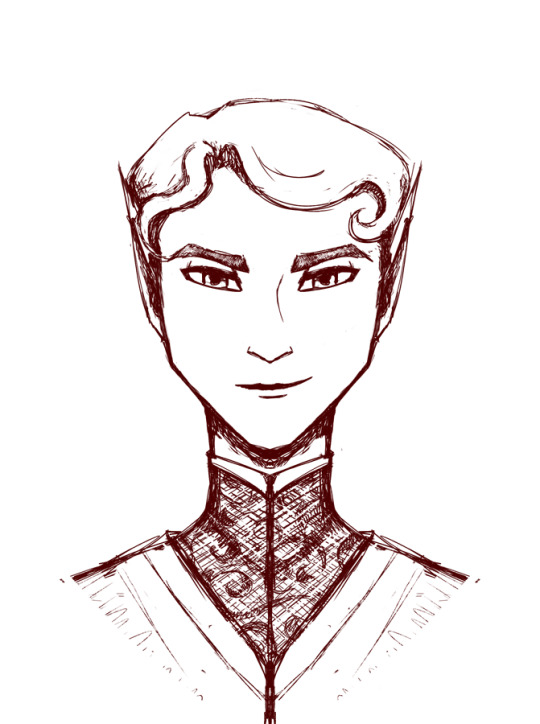
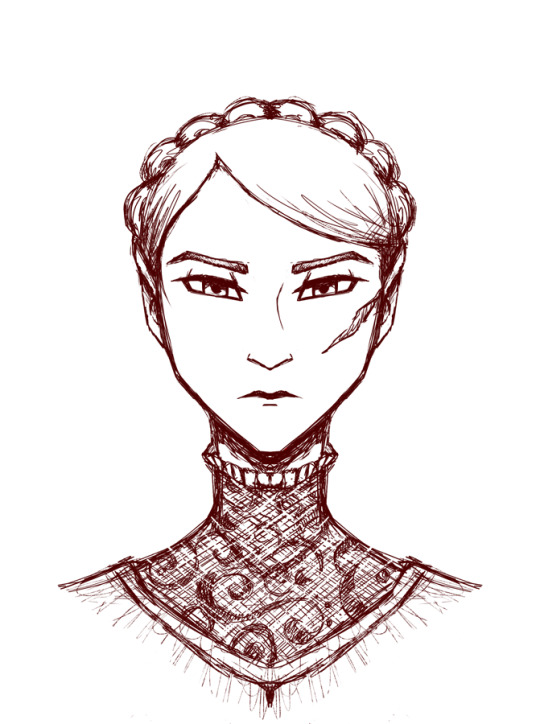
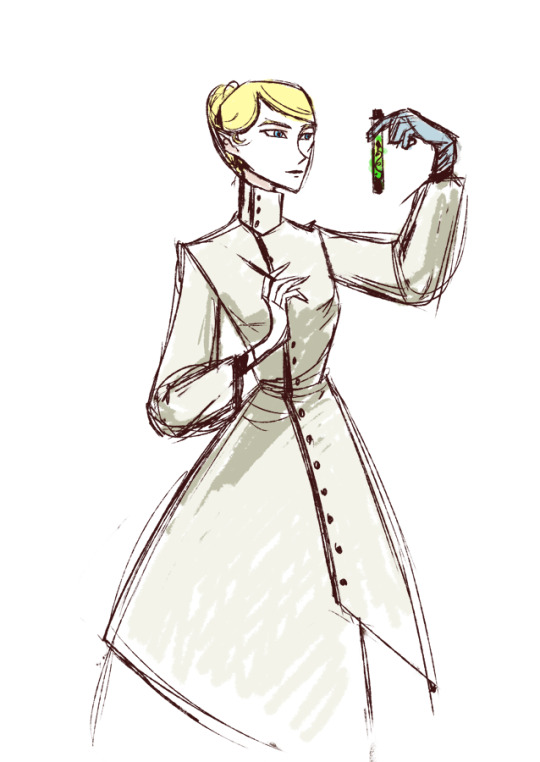
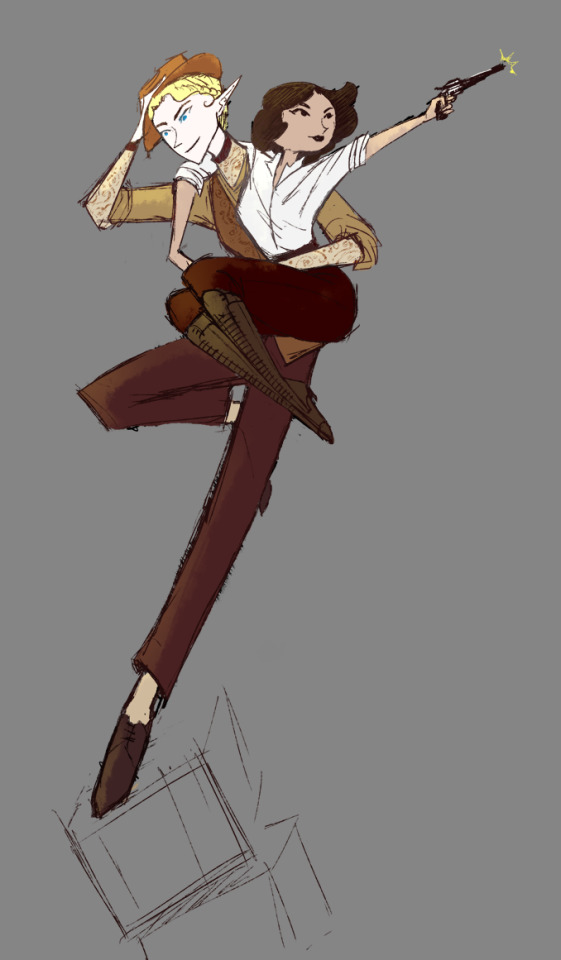
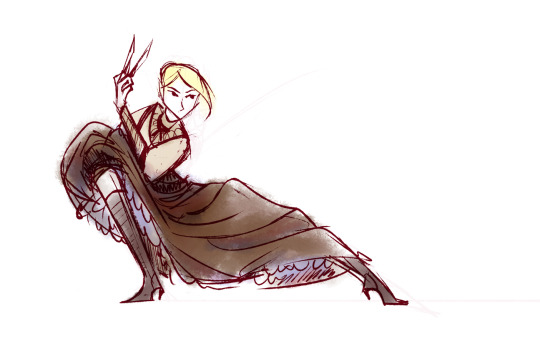

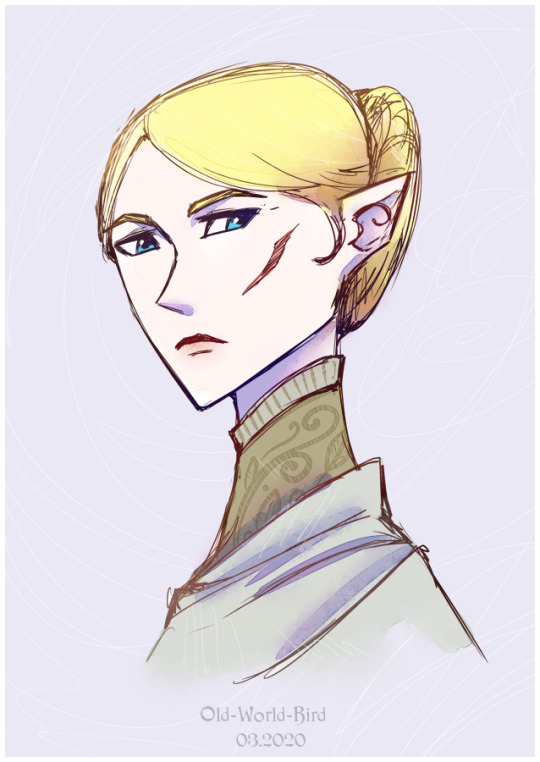


*Hits the table*
ALLOW ME TO INTRODUCE: MAJESTIC TWINS
Reasemus and Lettice, earlier versions
Gosh, I love these tsunder’ish idiots. Can you believe that they kinda run an elvish mafia? Me neither
7 notes
·
View notes
Note
Could you recommend some adult sff? Love your blog btw!
Thank you!
And ok, I could give you better personalized recs if you give me some idea of what you’re looking for or what you like, but I’m gonna give you some general recommendations. Also I only really feel comfortable recommending books that I have personally read, and there are tons more out there than what I have read. If you want to find more, looking at recent Hugo nominations over the past few years might be helpful. Also one of the reasons why I know anything at all about the SFF world is that I’ve been listening to the Sword and Laser podcast for like, a decade. I never really mention that podcast, but its literally why I started reading at all and also they have a pretty active goodreads group as well.
So recommendations:
Ancillary Justice by Ann Leckie:
This is one of my favorite books period. This is a far future space opera about an artificial intelligence who used to be a spaceship and now is only one human body, and she is ANGRY ABOUT that. I don’t really want to say more than that, but if you like AI shenanigans and being sorta confused as to what is going on the entire time, then this is the book for you! It’s the first book in a completed trilogy.
The Eye of the World by Robert Jordan:
Obviously I’m gonna recommend the Wheel of Time. This is the first book in a 14 (actually 15) book series and if you need something to do with the next 1-5 years of your life *motions toward EoTW*.
So the Eye of the World, I think is uniquely good as a book if you kinda want to get into adult fantasy for a few reasons. For one thing, its kinda considered to be one of those “classics” of the genre but its not too old to be offputting to some readers. It’s a 30 year old book, so its not reflective of the genre now, but you can definitely see its influence all the place, even outside of just books. The Eye of the World specifically, also goes out of its way to make readers comfortable. It leans heavy on Tolkien references and tropes at first without being a straight up copy of Lord of the Rings like some classic fantasy books are. Its done very purposefully, in my opinion, to make the reader feel like they have some idea of what’s going on, and the series quickly drops the Tolkien references as soon as its established itself enough.
Also the Gandalf parallel for the series is a smol bi lady and there is 24 year old rage healer who wants to fight everyone with her own two fists.So many women to stan.
Leviathan Wakes by James S.A. Corey
This is the first book of the Expanse, which is a nearish future space opera that takes place in our solar system. Mars has long ago been colonized and is a completely separate government entity than Earth, and conflict between the two planets has been stirring. The Asteroid Belt has also been colonized and have long been little more than tools of corporations that run their colonies. A group of ice haulers working in the outer planets get in the middle of one of the biggest secrets in the solar system and find themselves in all kinds of trouble.
I don’t really want to say more than this, but this is probably the only SF series that I actively keep up on when a new book comes out. There are 8 books our currently, and the 9th and final book will be out sometime in the near future. There are also several short stories and novellas set in the world, and there’s a TV show that I really like though I need to catch up on it.
The Fifth Season by N.K. Jemisin
Hello, this book comes with content warnings for literally everything, but it is such a good book/trilogy. This is book about a woman trying to find her daughter again in the middle of the apocalypse. Definitely a heavy read but absolutely brilliant. The world has a magic system based on geology and the people that can use that magic....saying they’re discriminated against is an understatement. I don’t want to say much more about it, but if you have any kind of content you can’t read for whatever reason, I’d check before picking this up. This is the first book in a completed trilogy
Station Eleven by Emily St. John Mandel
So this isn’t really super SF heavy and is actually sold as a literary book, but it takes place after a flu pandemic has wiped out a large portion of the population...so maybe this is a bad time to read this book, OR its the best time to read it. Depends on how you’re dealing with *motions at the world*
The book flashes back to before and during the pandemic a lot, but is largely about art’s importance and is actually quite optimistic in its messaging, and this is another of my favorite books ever. But yeah, might be a bad time for you to read it of you can’t deal with the content now.
The Priory of the Orange Tree by Samantha Shannon
I just remembered that this book also has a plague, but its a subplot and not the major thing. So this is a big ol’ chonky standalone book that is high fantasy, deals with multiple cultures having to interact and work together, and has dragons. Also there’s a genunine slow burn f/f romance and *chef’s kiss*. I can’t really say much else, mostly because I struggle to explain this book, but its very good and probably my favorite book from last year.
The Calculating Stars by Mary Robinette Kowal
In this house we stan Mary Robinette Kowal, ok?
So this is a science fiction that is more an alternate history that poses the question, hey, what would have happened if an asteroid slammed into the east coast in 1952 and the world had to scramble to colonize Mars so that everyone didn’t die on earth when the climate got catastrophic, because that’s the inciting action of the book. The main character is a Jewish woman who was a WASP pilot in WW2 and is a computer for the space program when all this happens. The book deals with sexism, and racism, and xenophobia, and all the social issues that are gonna come up with it being set in 1952, but Mary Robinette doesn’t flinch away from addressing social issues in any of her books, even when it makes her main characters look bad. (Also if you like Pride and Prejudice, she has a series that is just Pride and Prejudice with magic and like, yeah, its good).
A Natural History of Dragons by Marie Brennan
This is a book which poses a question, what if dragons were like weird animals that were real and an eccentric woman spent her entire life traveling the world to study them and then told the stories of that in her memoirs when she was too old to care about the consequences of publishing all her scandals. That’s what the book is about. This one is probably actually the weakest in the series, just because it deals with so much set up. It’s a great series to get on audio because Kate Reading is a fantastic narrator, and the prose works so well as audio, because it’s just someone telling you her life story. There are five books in the series.
All Systems Red by Martha Wells
So this is a novella and is the first in the murderbot series. Basically a killer robot gets addicted to television shows and accidentally became sentient. I haven’t read the others in the series, but I really need to reread this one and get to the others.
Jade City by Fonda Lee
This is a fantasy set in world sorta inspired by the early 1900s but is in a fantasy world. It’s like a mafia movie and kung fu movie had a baby and it was this book. The sequel is out currently, but the third book is set to release next year.
An Unkindness of Ghosts by Rivers Solomon
This is another heavy read. This is a SF story set on a generation ship that has a society very heavily inspired by the antebellum south. There’s class issues, race issues, gender issues, mental health issues. All kinds of things intersecting here. Its fantastic, but a heavy read.
Assassin’s Apprentice by Robin Hobb
This is another fantasy classic, and is the first of the Farseer Trilogy. The title is sort of also a description of the book, so like. I’m not sure what else I can say. I haven’t read further into the series, but people I trust love it, and honestly I need to reread this and read more of the books.
Doomsday Book by Connie Willis
So if you think that Station Eleven might be a bad book to read at the time, then this is THE WORST POSSIBLE BOOK TO READ RIGHT NOW. Or, maybe the best. Depends on how you cope. This is a book about time travelers based in Oxford and the main character accidentally gets stranded in the past right as the Black Plague is about to hit. And it hits. The book is horrific. The second book in the series is much funnier. This one ain’t funny, but is good. Just, oof.
Mistborn or Warbreaker by Brandon Sanderson
So if you want to get into the Cosmere, which is a series of series that interconnect and will ruin your life, then then my personal opinion is to either start with Mistborn or Warbreaker. People might not agree with me, but that’s my personal opinion.
Warbreaker is currently a standalone (a sequel will come out eventually but its not set up for a sequel so you can 100% read it as a standalone). The magic in this world is based on colors, and the story revolves around two sisters. One of them is betrothed to the horrific God King of their neighboring kingdom. The other sister ends up being sent in her place because their dad hates her. I adore Warbreaker so much. It has it all. Two women discovering their true places on the prep/goth spectrum. Talking swords. Vivenna. Everything you can need right there.
Mistborn is a trilogy that is very emo and will ruin you. Its about people who swallow metal to get magic powers and live in world where the dark lord won already, so they’re all emo. And that was the worst description of Mistborn I ever could have written, but I find it too funny to change.
So if you’re interested in the Cosmere, but are afraid to commit long term, pick up Warbreaker. If you want to get into a series right away, pick up Mistborn.
72 notes
·
View notes
Text
More on the earlier topic. Tropes and the modern fantasy genre: Tracking the evolution of genres is a bit of a hobby of mine. The development of the fantasy genre was heavily influences by Tolkien and The Lord of the Ring especially. Tolkien's works popularized high fantasy and brought Fantasy back into the realm of what is respectable for an adult to read. That said Tolkien did not originate many of Fantasy's tropes, and if we were to look at the Legedarium as a modern work, it would be quite subversive as the tropes in Tolkien's work predate the whole Fantasy genre. In the current meta D&D has the most influence, some direct but mostly indirect. But let's track some of the influences from Tolkien through D&D into more modern fantasy. (Please note this is all extremely reductive, like I'm cutting out all the conan the barbarian).
Perspectives on the past:Tolkien was a philologist, someone who studies the stories and histories hidden in words, (That's how the Silmarillion happened.) and he was deeply influenced by his work materials such as Germanic and Anglo Saxon epics. Let us look at Beowulf in particular. Beowulf as many other old stories were when the documentation/nationalism craze took over Europe recorded at a later date than it originates, or to put it another it was a heroic(in the old sense) epic as told by a Christian scholar than analyzed centuries later by the Brits. As much as it is about the warrior culture of the time, the final lines are a mourning for the end of that culture. A grieving goodbye for the end of an age. Sound familiar? Tolkien's Legedarium too is about the inevitable march of time, regardless of what happens next, the past will never be again. I should note here that Tolkien was a Catholic traditionalist (with all that implies) in the early 1900's. Thus (along with other inlfuences) established the trend of Fantasy looking back. Later fantasy works drop the inevitable change part (especially TTRPGs I'm looking at you 40k) and often end up in a static world that romanticizes the past. FE games often feel like that, nothing ever really changes. If we look at the world in Echoes compared to Awakening, what has really changed?
War: For all of Tolkien was immersed in heroic epics, his attitudes on war can better be traced to his experiences being deployed to the front lines in WW1 and losing all his friends but 1 to that war. Tolkien is a WW1 author though he is not often thought of that way. Tolkien's thesis is essentially that war is a terrible thing that humans have made and should be avoided. Hey hey have you guys read the fanfiction Tolkien wrote for "The Battle of Maldon"???? Its called "The Homecoming of Beorhtnoth Beorhthelm's Son" and its great. It is also the work that most succinctly (hahahahahahha) states his anti war sentiments. And of course its in the style of a dialectic. Its a good read. He is highly critical of the idea that war is in any way glorious. An idea that a lot of later fantasy flat out drops. There is no glory in war, only loss.
Heroes: despite everything Tolkien still believed in heroes (In a way Jackson and the movies didn't really). But in response to the great warrior heroes of legend, Tolkien believed in the everyday hero, that every ordinary person has the potential to rise to the occasion and help. Fighting capability and violence does not make a hero, but character and spirit, and doing what needs to be done. The best example is Sam. Tolkien also spent a lot of time playing with and subverting the traditional tropes of heroes. For example Turn who is set up as a archtypal hero but who keeps messing up and making things worse. Maedhros whose traditionally heroic qualities box him in and also make things worse. This stance on heroes also tends to be dropped with many Fantasy heroes destined or special in some way.
Lastly, above I often referred to Fantasy and in doing so mostly meant the image of fantasy that many have in their minds. This image is primarily derived from books publish in the 80's and 90's. In the last decade I have seen Fantasy have a rebirth, reincarnating into something new and fresh. In other words the archtypal Fantasy in many ways no longer exists. Current fantasy is influenced by urban fantasy, videogames, and the re-imagining of old mythology. Its also much more diverse. I was getting tired of the vaguely european coded straight cis male teenageer that grew up on a farm. I am excited for this future.
I forgot the eurocentrism!!!!
Tolkien as a white Englsih dude living in England in traditional academia and essentially being a European lit major was eurocentric af. I doubt it was intentional, just like I doubt Tolkien was aware of the extent of his racism and misogyny. Most people are to a degree, and if you are never challenged on it a person can go their whole life without realizing that they have assimilated a lot of bigotry. The 1800's and 1900's saw the rise of nationalism all over Europe, its how WW1 started. Every nation was having a big dick contest competing "Hey look! my culture/history/literature is better than yours". That's why philology was so popular, its about a langauge's history and tied to national identity. Its also why philology fell out of fashion because the Nazi's were really into that stuff. That's another influence on the Legedarium "A Mythology for England" Finland had the Kalevala but what did England have? Also. British Exceptionalism was totally a thing back then. The glorious British Empire~~ So all of that ended up in Fantasy. You can see it really well in D&D's Forgotten Realms. The Sword Coast (europe coded) is presented as the baseline and everywhere else is oooo~ so exotic and foreign. Now tracking this into JRPGs is where is gets real interesting because japanese society has this weird fetish for "The West", and white people. So you end up with this old romanticization of a kinda european-ish looking setting that's really disconnected from reality.
Bloodlines: The belief that X group of people is inherently different from Y group, feeds ideas of racism. As does the belief that because X group is different from Y group, descendants of X group have certain traits (moral, behavioral, political, etc) that make them different from Y group, that lineage means something. And Tolkien was caught up in these old ideas (these have been debunked). He did make progress when people wrote in about anti-semitic implications for the dwarves, including rewriting the Silmarillion (again), but I don't know if her ever fully dropped the idea. Consciously he was very much against racism and everything the Nazi's stood for, but subconsciously like most other white people at the time he held within him the seeds of racism.
0 notes